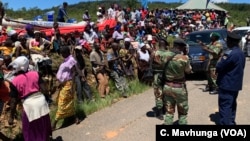The United Nations Development Program (UNDP) says preliminary findings show that an estimated 250,000 people in Zimbabwe have been impacted by Cyclone Idai, which devastated some parts of the country, Mozambique and Malawi, leaving more than 750 people dead in the three nations.
In a statement, the UNDP said, it is also estimated 37 percent (121,000 people) of the rural population in Chipinge district require urgent food assistance, while 77 percent (114,000 people) are in need of food assistance in Chimanimani.
“At least 35,000 households - with over 120,000 women and over 60,000 children - are in urgent need of protection interventions in the two assessed districts (Chimanimani and Chipinge). An estimated additional 100,000 children are in need of welfare and civil registration services in nine districts.”
The UNDP further noted that infrastructure sustained significant damage with 95 percent of the road networks in the affected areas damaged by heavy rains.
“In addition, some 48 schools, 18 water points and 10 bridges have been damaged or destroyed.”
The United Nations agency said search and rescue operations are continuing, with active operations still underway. The government says 179 people died while 329 people are missing. Observers indicate that up to 259 people have died.
“Efforts are being made to recover bodies that were trapped under mudslides and rubble. However, progress has been slow due to the difficult weather conditions. Command centres have been established for people rescued.”
It said access to clean water remains a challenge. “Water supply infrastructure has also been damaged and Chipinge town is without access to clean water.
According to the UNDP, households in Chipinge depended on livestock (small-scale dairy) as a key income-generating activity from an estimated 100,000 herd of cattle, 200,000 goats and 60,000 sheep.
“A significant percentage has lost their herds. All the district’s 73 dip tanks were flooded. Tickborne disease is a threat to those that survived … Most livelihoods activities in the region have been disrupted. Of the assessed areas so far, over 1,500 ha (hectares) of irrigation schemes have been affected. Crops have been submerged. Infrastructure including weirs and canals have been silted, boreholes submerged and irrigation equipment swept away.
“Chimanimani and Chipinge remain the hardest-hit districts, with access still problematic, especially in Chimanimani. Crops and livestock have been destroyed in both districts, which were already facing crisis levels of food insecurity. Power supply and communications are disrupted in affected areas.”
Rains have started to dissipate in Manicaland and Masvingo provinces. UNDP, as part of the joint UN team, says it immediately deployed manpower to the affected areas to assess the extent of the devastation on people, livelihoods and infrastructure.
“The rapid assessment report will inform immediate response and rapid deployment of assistance and start early recovery work.”




